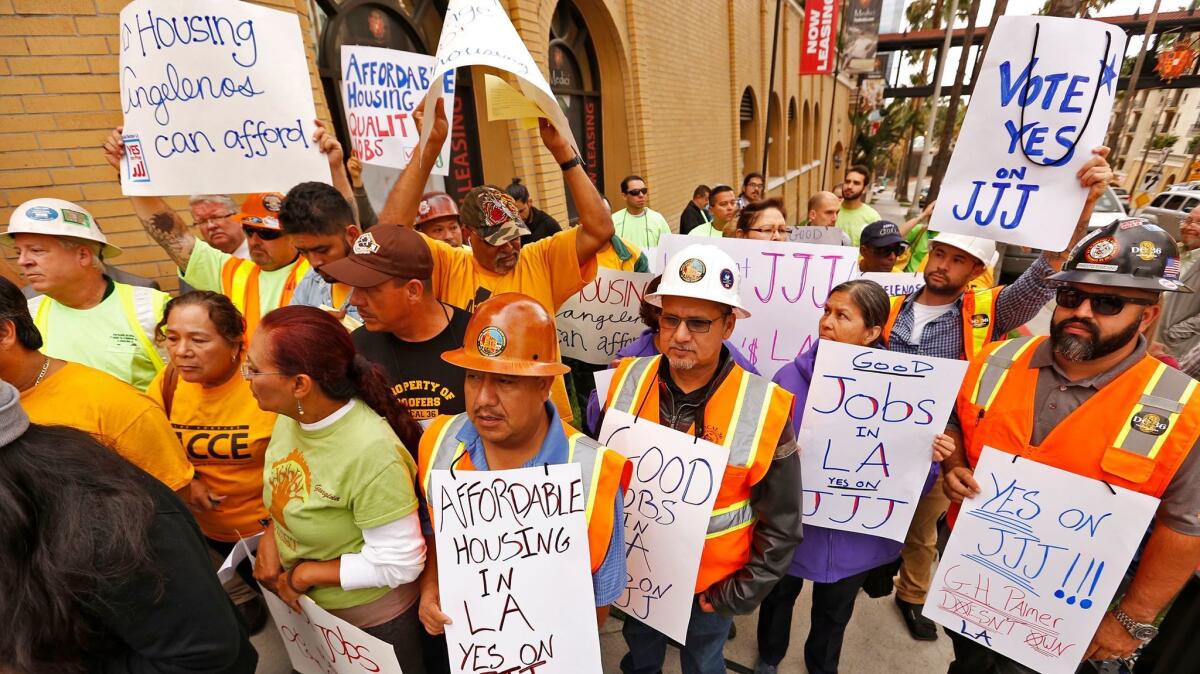L.A. has a program to build affordable housing near transit. Of course, NIMBYs want to shut it down

- Share via
California desperately needs to build more homes to ease its housing shortage, yet residential construction remains sluggish across the state. One exception is Los Angeles, the rare city that is having a building boom.
Thousands of new apartments are in the development pipeline in L.A., all because of a program approved by voters in 2016 that makes it easier to build taller, denser buildings near rail stations and major bus stops if the projects include affordable housing.
The Transit-Oriented Communities incentive has been wildly successful, with nearly 20,000 units proposed in the two years since it was created. About 20% of those would be set aside for low-income tenants, providing thousands of units of affordable housing without taxpayer funding.
So, of course, a slow-growth group is now suing to stop the program.
Last week, Fix the City filed a lawsuit against the city of Los Angeles to block one specific TOC project near Century City and to overturn the entire program on the grounds that it violates city and state laws. This is par for the course for the group, which has repeatedly sued to block projects and plans designed to shift L.A. from car-centric suburbs to denser, more multi-modal neighborhoods near transit.
What’s especially frustrating about this particular lawsuit is that it seeks to halt a voter-created program that is going to generate a lot of housing along major public transit corridors. That is exactly where Los Angeles should be concentrating its new housing supplies so more people who live or work here can get around without driving, which will help with congestion and cut the greenhouse gas emissions responsible for climate change.
Plus, the program ensures that these new projects include affordable housing so that low- and moderate-income Angelenos — who make up the bulk of public transit ridership — are not priced out of transit-friendly neighborhoods.
While Transit-Oriented Communities is now the target of a lawsuit, it was probably the least controversial aspect of Measure JJJ, the November 2016 initiative that created the program.
Measure JJJ was put on the ballot by housing and labor groups as way to build more affordable housing and create more high-paying construction jobs. It was also designed as a counteroffensive to the proposed Neighborhood Integrity Act (Measure S), which was a slow-growth, anti-development initiative on the March 2017 ballot.
Measure S proposed a moratorium on developments that sought exemptions from planning rules; Measure JJJ allowed such exemptions as long as the developers agreed to pay union-level wages to construction workers and to build at least some units that would be rented out at below-market rates.
Voters passed Measure JJJ and then rejected Measure S overwhelmingly — a sign that the Los Angeles electorate wanted to see more housing construction, not less.
Business groups and developers, along with the Times Editorial Board, had opposed Measure JJJ, warning that its expensive wage, local hire and affordable housing requirements could deter developers from building more housing. The TOC program got little attention during the campaign, but it’s on track to be the most important piece of the initiative.
The Fix the City lawsuit alleges the Planning Department’s TOC guidelines went further than what Measure JJJ intended and weren’t approved by the City Council. It also claims that TOC developers aren’t paying union-level wages. However, the ballot initiative directed the Planning Department to create guidelines in 90 days without needing extensive public hearings or City Council approval, and the measure explicitly exempted TOC projects from the JJJ labor standards. Also, the incentives are available only for commercial and multifamily properties within half a mile of a major transit stop, which is just 10% of the city’s zoned land.
The voters spoke in 2016 when they passed Measure JJJ. They want Los Angeles to build more housing, especially affordable housing. That would truly help fix the city.
More to Read
A cure for the common opinion
Get thought-provoking perspectives with our weekly newsletter.
You may occasionally receive promotional content from the Los Angeles Times.









